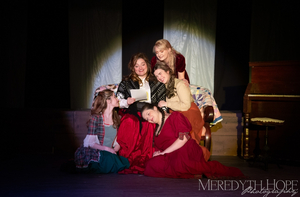Review: LITTLE WOMEN at Monticello Opera House

Little Women Puts Sisterhood to Music
Put the stories of sisterhood to song, and those stories take on new dimensions. If you took away the period costumes and the set elements that represent the 1860s, the March sisters of The Monticello Opera House production of "Little Women" could be four sisters of 2020, each seeking her place in the world.
This period piece is a musical inspired by the classic novel "Little Women," which is loosely based on author Louisa May Alcott's life and dates back to 1868. The musical has a book by Allan Knee, lyrics by Mindi Dickstein and music by Jason Howland. It follows four sisters -- Amy, Beth, Jo, and Meg -- as they cope with a turn of events that sees their fortunes diminished, their father away being an Army chaplain and their varied life goals challenged.
The lively orchestral overture establishes the mood for the opening scene, in which Jo (Madison Ducatt) bristles at yet another rejection of one of her stories, as she seeks the opinion of Professor Bhaer (Michael Mello). Absent a glowing review from him, and unhappy with his pronouncement that her work is "unique," her mind wanders back to a time when her sisters helped the story come alive.
After the sisters reenact Jo's "blood and guts" story," the tempo of the show changes with the gorgeous harmony of "Our Finest Dreams" by Jo, Amy (Mia Pesta), Beth (Autumn Maxwell), and Meg (Ashleigh Littlefield).
Marmee (Jessica Ogden), the girls' mother sets up a persona that balances discipline, humor and compassion while clearly grappling with her own loneliness due to her husband being away and her stress at their financial straits. In "Here Alone," Marmee sings, "I don't know what is harder -- what I know or what is unknown."
Another thing that is unknown is exactly what each March sister will be. Will Jo be published? Will Amy be accepted into society as she so desperately wants? Will Meg be wed as she hopes? Will Beth have a long and fruitful life making the music she loves so much?
Various men play roles in the March family's life. Laurie Laurence (Conner Fabrega) is full of youthful energy and his "Take a chance on me" is effervescent as he tells Jo, "You make me beam."
Jo March tends to draw audience members in, but there are many layers to this representation of the four sisters' lives and how they deal with the highest of highs and the most difficult of lows between their father's absence, the extremely specific ideas Aunt March (Mosisah Mavity) has about how a young lady should conduct herself, and the outcome of Beth's illness.
The production numbers around Jo's stories are like being at a whole different show, to the credit of her imagination.
The period costumes, such as Marmee's red hoop skirt, black shawl and white shirt take audience members back to the 1860s in a credible way.
The set is kept, as Director Naomi Rose-Mock writes in the show notes, "simply and slightly abstract ... to allow for the action to move nonlinearly through time." Such relatively simple sets work for this show and allows the cast members to shine.
"I'm not all girls," says Jo early on in the program. Neither are any of her sisters, in individual ways. "I can be astonishing," says Jo later. Visit this show to find out if she lives up to that dream, and be astonished at what a group of dedicated actors can do to put sisterhood to music.
The show is accompanied by a 9-piece orchestra under the direction of Dr. Judy Arthur. Marsha Adams is the stage manager, D.J. Paradis is in charge of lighting, Jason Vizzo is the technical manager, Mike Mock handles sound design and Colleen Towey is the costume manager.
Note: The show is double-cast in several roles.
For more information, visit the Monticello Opera House website.
Photo Credit: Meredyth Hope Photography
Reader Reviews

Videos
